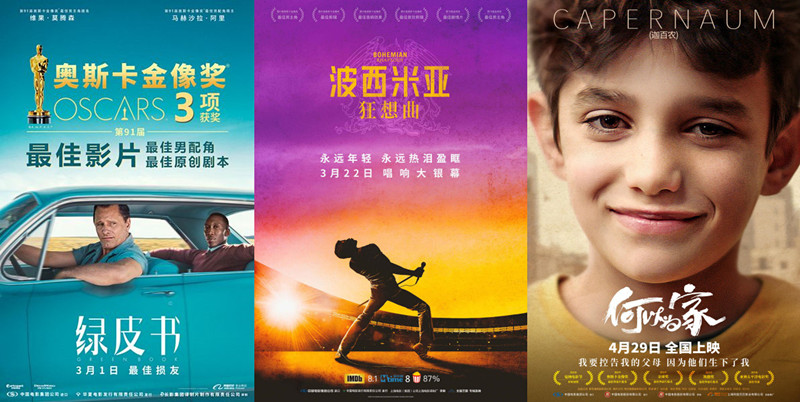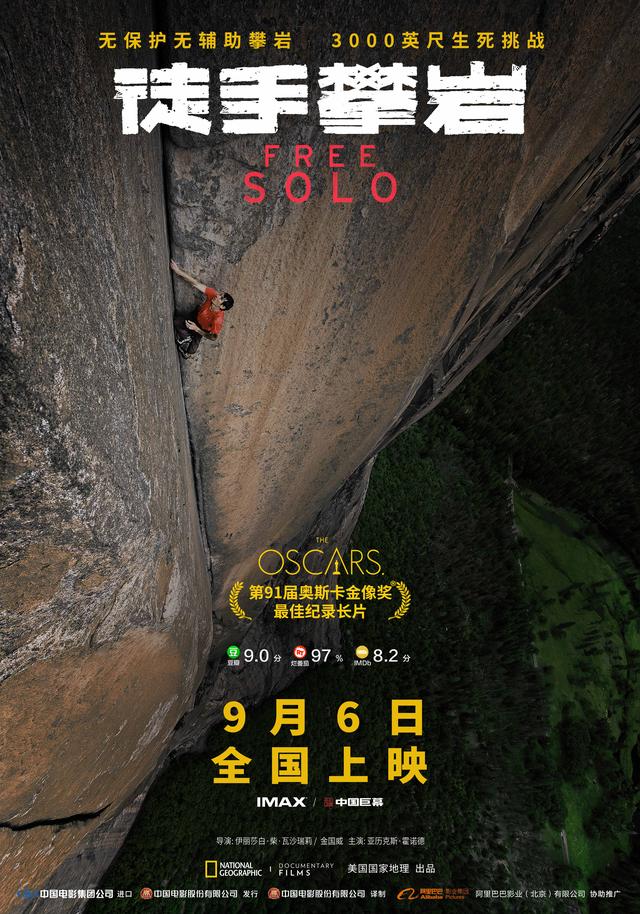Alibaba uncovers an Oscar gold mine
- By Zhang Rui
 0 Comment(s)
0 Comment(s) Print
Print E-mail China.org.cn, August 23, 2019
E-mail China.org.cn, August 23, 2019

Alibaba Pictures and associated entities has successfully co-financed or marketed several Academy Award-winning or nominated movies, and now has a new release waiting in the wings, "Free Solo."
The company, under China's e-commerce giant Alibaba Group, has succeeded in promoting critically applauded films to Chinese audiences once accustomed only to Hollywood blockbusters. In the past, Alibaba had a stake in such screen epic projects as "Mission: Impossible" franchise and other major releases; now, it is adjusting its strategy.
"Green Book," directed by Peter Farrelly and starring Viggo Mortensen and Mahershala Ali, won best picture and other two awards at the 91st Academy Awards early this year, earned 477 million yuan ($71 million) in China, the biggest box office triumph in an overseas market for the film, and only $14 million shy of its haul in North America.
Though the film deals with racial discrimination in the "Jim Crow" era that might not necessarily resonate with Chinese people, the audience here still liked its spirit and unlikely black-and-white brotherhood.
Jack Ma, founder of Alibaba Group, who had seen the film three times, showed up at its premiere in Beijing on Feb. 25 to share his admiration and insights, saying: "This film shows me the warmth of society, which offers much hope. It looks very ordinary and plain, yet it reflects many stories hidden beneath its surface. I think this film will get everybody thinking."
By funding "Green Book", Alibaba Pictures became the first internet company in the world to fund a film winning the top Oscar award, which Alibaba executives saw as a historic milestone.
Alibaba also helped market "Bohemian Rhapsody", the Queen biopic and celebration of lead singer Freddie Mercury that won four Oscars. It was screened on a limited basis in theaters under the National Alliance of Arthouse Cinemas (NAAC), a group formed in 2016 and operated by the China Film Archive and a consortium of theater chains supporting art-house films.
It even also released a singalong version for fans to satisfy the local passion for karaoke. Eventually it made 98.8 million yuan ($13.98 million), which wasn't a bad return.
However, the biggest triumph for Alibaba was Nadine Labaki's "Capernaum", a Lebanese-made vehicle also known by the alternative title of "Capharnaum". In China, it was given a new title, "Where's My Home?", a change suggested by the Alibaba marketing team, thanks to its resources and big data from the convenient and powerful marketing platform Beacon for China's film industry. They believed it would resonate better in a China transformed in the past decade by urbanization and explosive growth of migrant workers.
Road Pictures CEO Cai Gongming, who imported the critically-acclaimed film, said on June 17 at a forum during the annual Shanghai International Film Festival, that Beacon's data showed them how they could market the film alongside the blockbuster "Avengers: Endgame", because the two films attracted a different target audience.

Moreover, "Capernaum" already had a great word-of-mouth marketing campaign, high critic ratings, and huge support from female viewers.
Besides changing the title, Alibaba and the distributors took many other bold approaches in marketing and adapting the film for Chinese tastes, including making a new poster with the film's young protagonist smiling – using the only smiling shot on-screen in the film. They also changed the ending by adding a brief epilogue explaining that the young boy had gone to school, a more encouraging ending than the original somewhat depressing one.
The film eventually grossed more than 373 million yuan ($53.86 million), exceeding everyone's expectations. By comparison, although being nominated for best foreign-language film in this year's Oscars, it hadn't made $2 million in any other markets.
"They have a really good feel for what would seem to be an American story, and take the pieces of that story and translate them into a language Chinese audiences can understand," Jeff Small, president of Amblin Partners which produced "Green Book", told The Wall Street Journal in a recent report.
Now, many in Hollywood see Alibaba as a suitable partner to help navigate a marketplace with different moviegoer expectations.
The new promising project will be the Academy Award-winning documentary film "Free Solo." The film made its China debut at the Beijing International Film Festival in April and was screened at the Shanghai International Film Festival in June. All the showings were sold out within minutes.
The 2018 documentary film is directed by Elizabeth Chai Vasarhelyi and Jimmy Chin, an American couple of Chinese descent. It intimately records the rock climber Alex Honnold's stunning and inspiring unaccompanied and unsupported ascent of the 3,000-foot El Capitan in America's Yosemite National Park in June 2017.
Imported by China Film Group and with promotion undertaken by Alibaba Pictures and its ticketing platform Taopiaopiao, the film will have wide release in China starting Sept. 6, with an IMAX version. The hope is that the film about extraordinary human achievement will resonate with Chinese moviegoers.
"The audiences in China are developing their special tastes," said Alibaba Pictures President Zhang Wei. "People no longer feel they only have the chance to see a big action spectacular."






Go to Forum >>0 Comment(s)